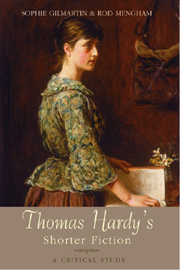4 - A Changed Man
Published online by Cambridge University Press: 12 September 2012
Summary
Hardy's final volume of short stories, A Changed Man, brings together work written at various points during a period of almost twenty years, between 1881 and 1900, and this helps to give it a more miscellaneous character than the other three books discussed in this study. That said, it is also the case that six of the stories represent Hardy's final attempts at literary fiction, being written between 1893 and 1900, and this chronological proximity is clearly a factor in their related choices of subject and setting.
This chapter will focus on the group of late stories, with occasional reference back to the earlier work, beginning with the 1885 text, ‘A Tryst at an Ancient Earthwork’, since this provides a convenient stepping-stone to discussion of the themes of historical retrieval and the ethos of keeping faith with the past. The story is unusual in Hardy's output in its sustained use of the present tense, which is paradoxical given its imaginative fascination with events up to 2,000 years old. The ‘tryst’ referred to in the title is a meeting between the narrator and an antiquarian who proposes to excavate a part of the Iron Age hill-fort where the action is set.
The meeting has to take place at night, since the digging is actually illegal and can only be carried out under cover of darkness. The illegality is compounded by the removal from the site of a Roman statuette, thus provoking questions about the value of historical enquiry, whether carried out by archaeologists or by writers; whether the recovery of historical evidence is carried out with respect and integrity, or whether it becomes the merest pretext for selfish appropriation.
- Type
- Chapter
- Information
- Thomas Hardy's Shorter FictionA Critical Study, pp. 117 - 135Publisher: Edinburgh University PressPrint publication year: 2007



